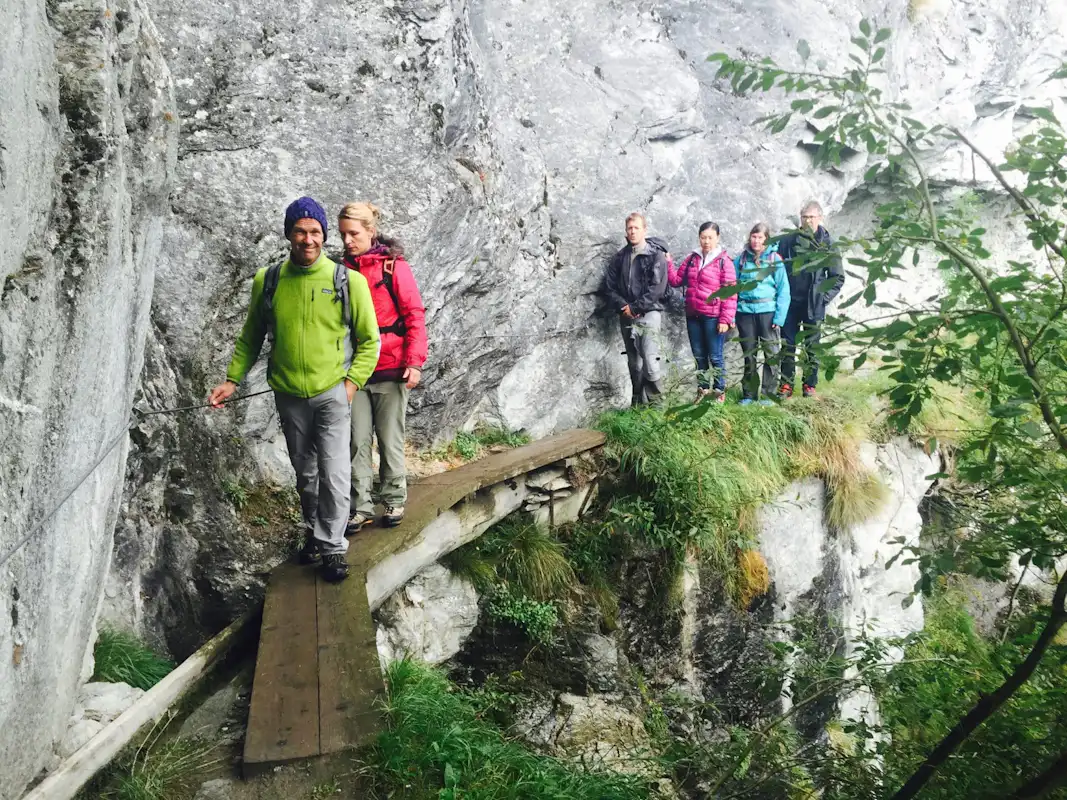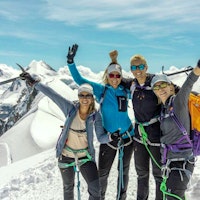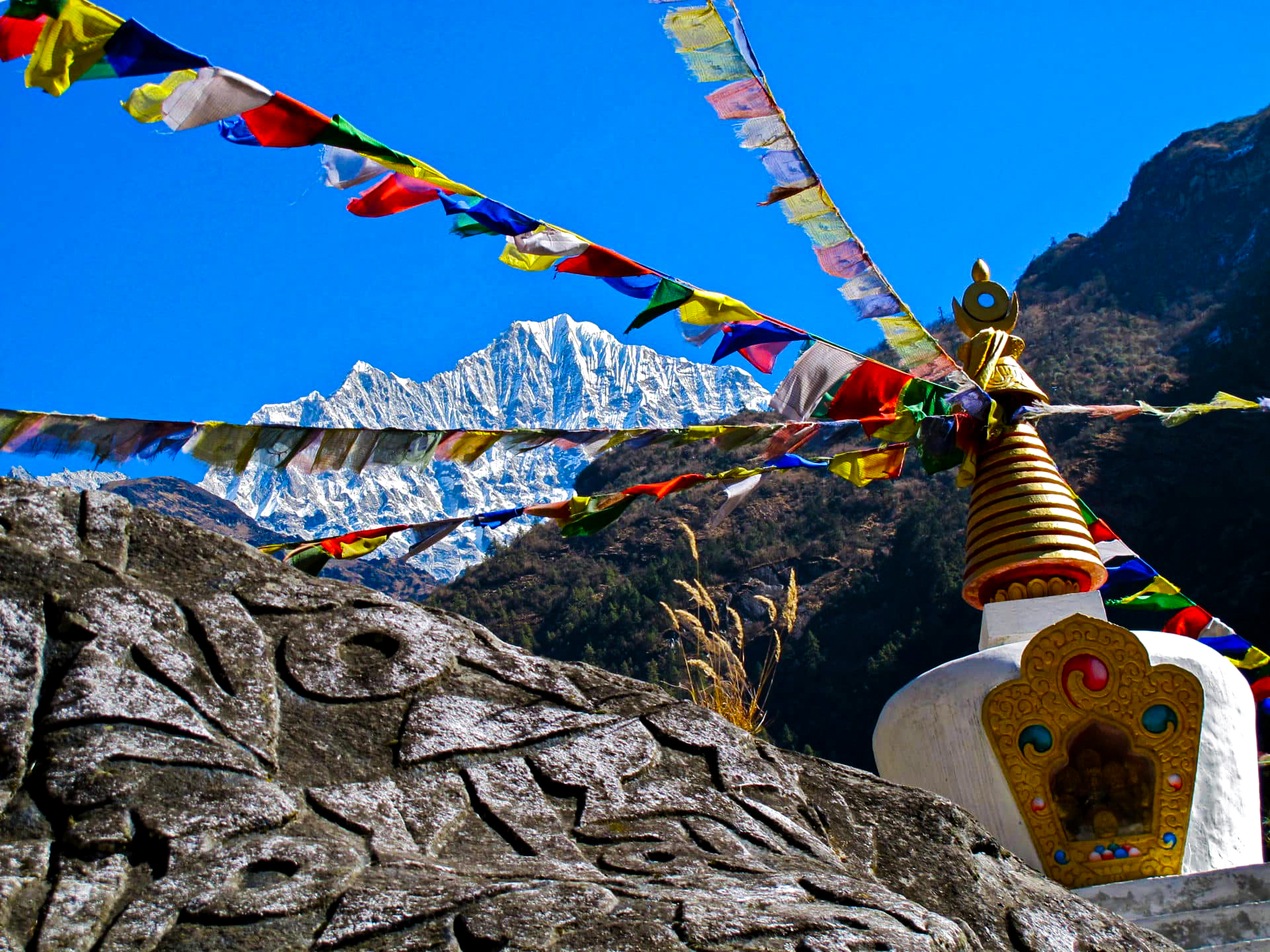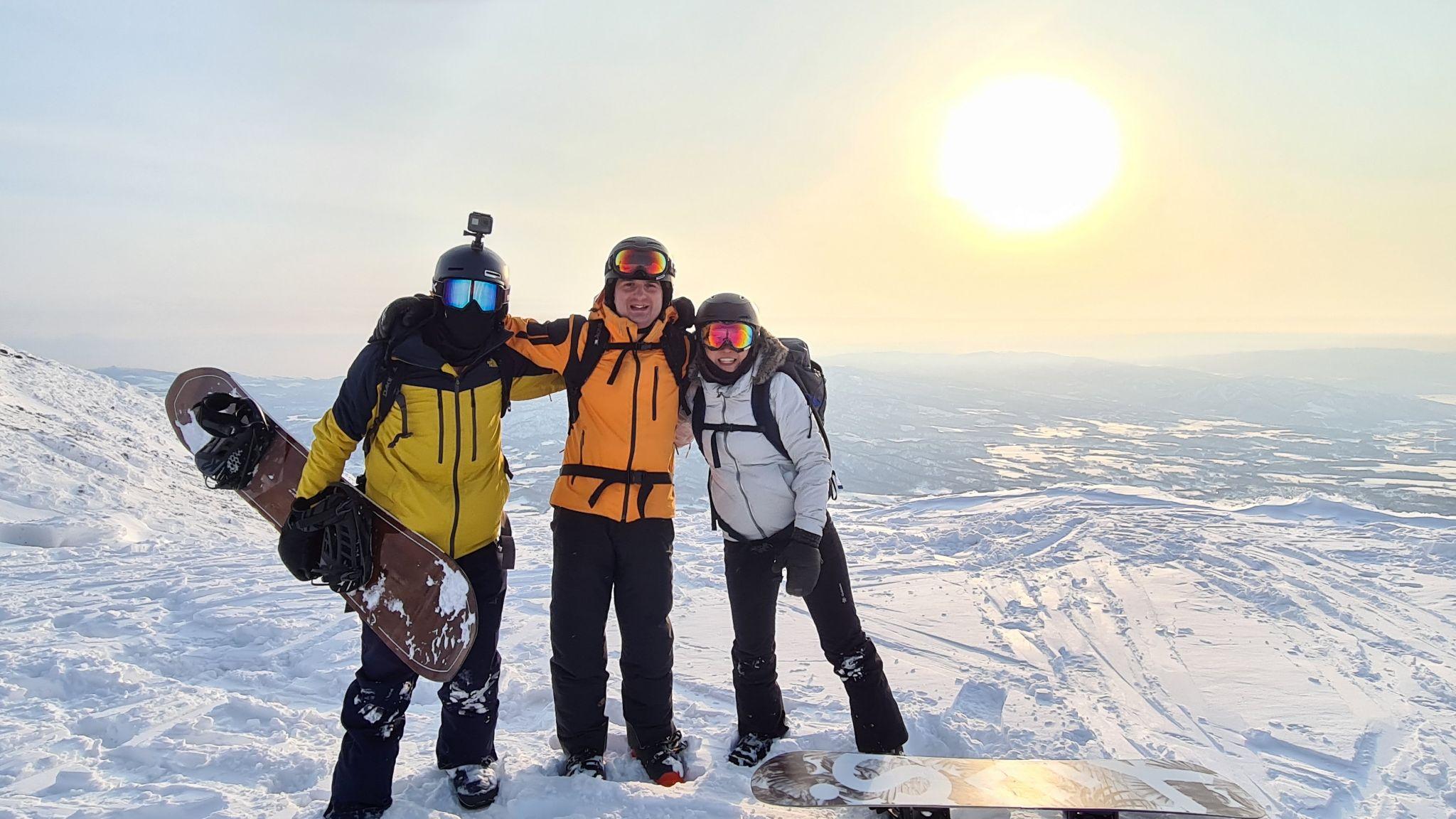Back in 2015, UIMLA-certified mountain leader Pascale Haegler was speaking with a fellow guide: “We spoke about our big tours – Matterhorn, Chamonix Mont-Blanc, Chamonix Zermatt – and we realized that we always had people who were afraid of heights”.
She speaks with us from “down in the main valley”, where her family lives, after an intense winter season. Pascale is part of the rescue patrol in the winter time. Before being a mountain leader, she was a journalist until 1998. Since then, “the mountain became my office”.
She has been offering her Overcoming fear of heights program in Val d’Anniviers, Switzerland, for several years now, among other programs. She is very happy with the results so far: “I’m very surprised at how successful the program is. At the beginning I wasn’t sure, so we started with small groups”.
She speaks in plural, because on this program she brings a partner along: François Castell, a specialist with a degree in Mental Training. Together, they have created a very unique and successful partnership: “Now, around 50% of those who come on this program are ‘healed’; 30% feel better but still need to work some more; and maybe for 20% it doesn´t fully work. The last group we had in September 2017 was 100% a success”.
Dealing with fear
“When you speak about fear, it’s never easy”, Pascale tells us. “We try to reprogram people’s brain – the hard disk. For 80% of those who say they are afraid of heights, it’s in their heads”.
The teaching method that Pascale and François have created is focused on sharing experiences and techniques in natural settings, while always providing a completely safe physical and psychological environment. The program is based on acquiring techniques to grow in confidence and overcome insecurities, and any possible dizziness.
“The program is progressive”, explains Pascale. “On the first day, we speak about fears. Each guest fears different things in the mountain – the cliff, unstable ground, slow rope…”. The day starts with a theory lesson, and then continues in the beautiful area of Mayoux (Valais, Switzerland) for the practical part [You can have a closer look at the itinerary here].
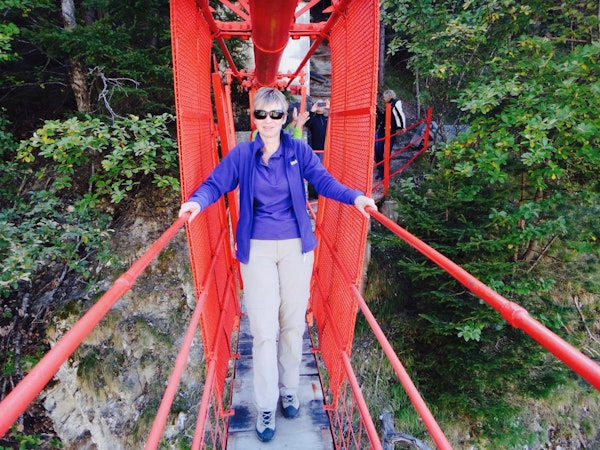
The crossing of the L’Araignée Bridge is a crucial part of the program. Photo credit: Pascale Haegler.
About this first contact with her guests, Pascale says: “With every new program I get material to write my own dictionary of excuses. People who are afraid of heights always find excuses. ‘This is too small for my feet’… “Are you sure this bridge is safe?’… This is what we work on first”.
“A lot of people who join, they want to be better, to be more confident. We work a lot with them”. Part of the program also includes a traditional and cultural aspect – it’s about balancing the pressure: “Just as they arrive, they are so focused. When we are not doing activities, we try to cut them some slack. For the first lunch, for example, everyone has to bring a specialty from their country. On the second night, we share an apperitive in a typical cave. But when we start working on their fears again… they immediately focus on it again.”
What fear looks like up in the mountain
Our mental predisposition to different situations can define the way we experience life. Fear tends to creep up in unexpected ways. When it comes to hiking or mountaineering, Pascale says that there are four usual mental approaches:
1. ‘Where I am right now? How are my feet positioned…?’
2. ‘How am I going to position my body for the three or four meteres of terrain ahead?’ – Living in the moment.
3. ‘I am looking at the trail ahead and I can see that it is tricky’.
4. ‘I know that behind that huge mountain there is something very challenging, but I am not sure what…’
People who are afraid of heights are always in a number 3 and 4 mindset. What Pascale’s program tries to do is to always bring them back to stages 1 and 2.
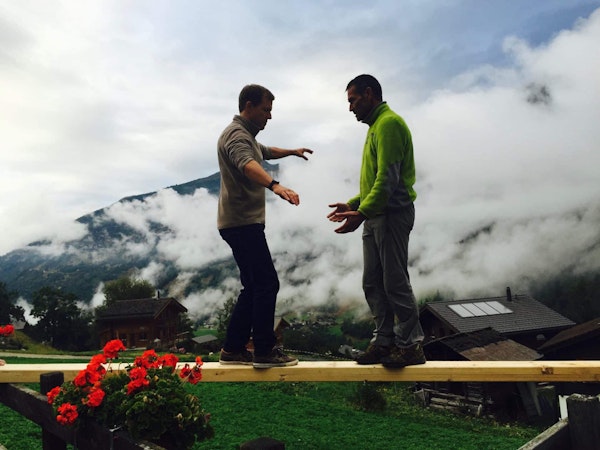
Photo credit: Pascale Haegler.
A program different to all others: ‘fear’ is a personal experience
“The very first thing to make clear to our guests is that that this is not a challenge. Everybody has its own level of fear, and everyone has to go with that level of fear”, she reiterates.
“There is no competition, and no failure. It’s a personal program. It’s about your personal fear”.
This is why, as Pascale tells us, the energy of the group on this program is very different than the energy in other groups: “People encourage each other, they clap. We do have a maximum of 10 people per group, because it requires a lot of individual work”.
Pascale makes it clear that during the whole duration of the program guests are free to decide whether to continue or not. “We have a series of rules on this program. One of these rules is that guests can leave if they wish to”.
“Some don’t do the last day of the program because it demands a lot of energy. But then, very often, they send me pictures from a high peak they managed to climb. One girl just made it through the first day and then sent me pictures from Nepal”.
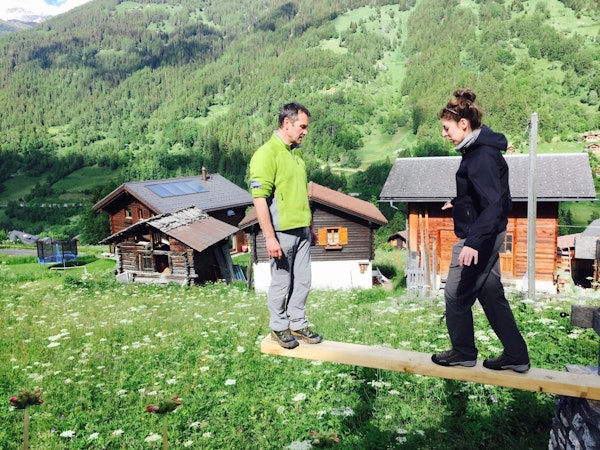
Photo credit: Pascale Haegler.
Beyond the ‘fear’
This program is very special to Pascale:
“It’s a great human experience, a great human exchange. It’s great for people who have a fear of heights to know that they are not alone. Sometimes people don’t respect ‘fear’. It’s important to respect the fear”.
This is what summarizes Pascale’s experience with this particular program. She plans to continue offering this program, as it gives her so many satisfactions: “I found a nice market on this project. I’m the only one who is doing this in Switzerland”.
Thank you Pascale for sharing your experience with us!
Check out the next departures of Pascale’s Overcoming fear of heights 3-day training in Val d’Anniviers program here!
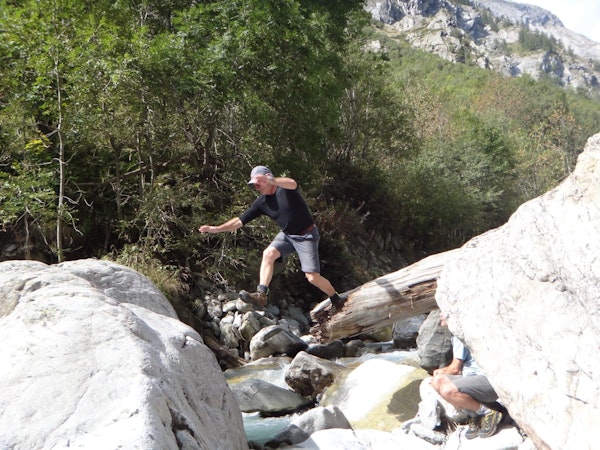
Photo credit: Pascale Haegler.
[EXTRA] In first person: Mini interview with Barbara Busca
Barbara is originally from the USA, but has been living in Geneva for the past 45 years. She used to work for the World Health Organization (WHO), and is now retired. She took Pascale’s program a couple of years ago, and later took a shorter ‘booster shot’ program a year later. This is her experience:
How would you describe your fear of heights before this program?
I was not the worst affected. I would go places if Pascale told me I could do it, but I didn’t like it. What I hate are places where “if you fall, you die”, so it is not fear of heights strictly speaking. For example, I don’t have problems on the suspended bridges because I am safe whereas others really hated them.
What made you take this step and join the program?
Well, you can’t really avoid coming across places like this if you do a fair amount of hiking.
How would you describe the experience?
Excellent. Both Pascale and Francois are great.
What were your main concerns and fears regarding the program?
Not big fears, just expecting uncomfortable situations, wondering how many I would refuse. But I trusted Pascale, and that helped me overcome my fears.
What is your relationship with heights like today? Do you continue to go to the mountains?
Yes, of course, I continue to go to the mountains – I never stopped. I also get together occasionally with 3 others from the course and they all have made great progress. This summer I will be participating in a 4-day hike on several different ‘bisses’ [open irrigation channels typical of Valais], which always have some scary parts.
What would you tell someone who is thinking of taking the program but is not sure?
Take it! It will make hiking more of a pleasure. Especially if you are someone who stays home if the hike has scary parts, or who turns back if they hit a scary part. This course will open up new doors. There were people like that in our course.
Thank you, Barbara!
